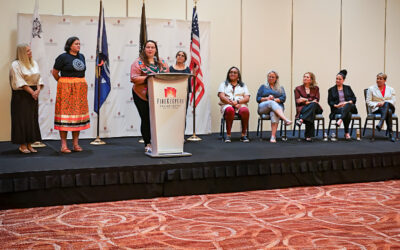HONORING MISSING AND MURDERED INDIGENOUS WOMEN AND GIRLS
The numbers are staggering. Native American women and girls are being stolen and harmed at alarming rates.
Murder is the third-leading cause of death among American Indian/Alaska Native women, with the majority of these murders committed by non-Native people on Native land. In fact, Native women are 10 times more likely to be murdered compared to the national average, and 84% have experienced violence in their lifetime.
The crisis continues to escalate as missing persons cases, lack of recognition of violence against Indigenous women, and a critical lack of documentation continue to under-represent the full scope of the abuse. To shine a light on the issue and honor our stolen sisters, NHBP recognizes May 5 as the National Day of Awareness for Missing and Murdered Indigenous Women and Girls.
“We wear red on May 5 in solidarity with Native Nations to give voice to the thousands of Missing and Murdered Indigenous Women and Girls who deserve to be a national priority,” NHBP Chief Judge Melissa Pope said. “With your help, our Sisters can be returned home, where survivors can receive culturally-honoring care to help heal from the trauma, and for those whose lives have been tragically taken, their loved ones may find comfort in caring for them in the Spirit World through the ceremonies of their Nations. Through the collective commitment to end the silence, we must demand justice for each and every Missing and Murdered Indigenous Woman and Girl.”
Nearly 6,000 cases of MMIWG were reported in 2016. Yet only 116 of those cases were logged in the U.S. Department of Justice’s federal missing persons database.
Missing data — coupled with a lack of communication between state, local, and Tribal law enforcement — makes it difficult to begin the investigation and prosecution process, often depriving victims and their families of justice or the hope of being found.
In the Great Lakes area, the Urban Indian Health Institute has recorded one MMIWG case in Illinois, one in Michigan, six in Wisconsin, and 20 in Minnesota, including 25-year-old Ojibwe woman Tess White, who was pregnant when she was tortured and killed in 2016.
But without assistance from non-Tribal federal, state and local agencies, these cases have gone underfunded and uninvestigated.
In an effort to investigate and resolve these thousands of unsolved cases, a new Bureau of Indian Affairs unit has been launched by Interior Secretary Deb Haaland. The Missing and Murdered Unit will provide the resources and leadership to prioritize these cases and coordinate resources to hold people accountable, keep Native communities safe, and provide closure for families.
“Whether it’s a missing family member or a homicide investigation, these efforts will be all hands on deck,” Secretary Haaland said. “We are fully committed to assisting Tribal communities with these investigations, and the MMU will leverage every resource available to be a force-multiplier in preventing these cases from becoming cold case investigations.”
If you or someone you know is a victim of violence, there is help. For more information about the Victim Services Department, contact Domestic Violence Victim Advocate Patti McClure at 269.704.8396 or patricia.mcclure@nhbp-nsn.gov or Victim Services Assistant Alyssa Smith at 269.832.0532 or alyssa.smith@nhbp-nsn.gov. Or reach out to the National Native Helpline for domestic and sexual abuse, StrongHearts 24/7 Native Helpline at StrongHeartsHelpline.org or 1.844.762.8483.




0 Comments